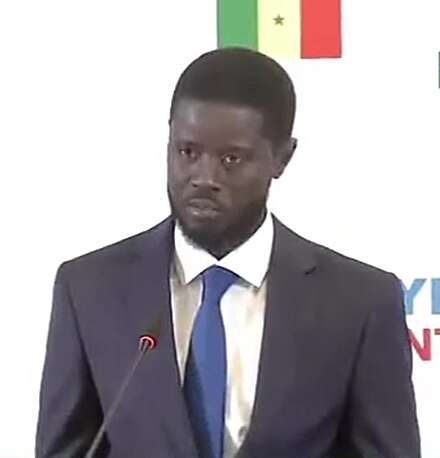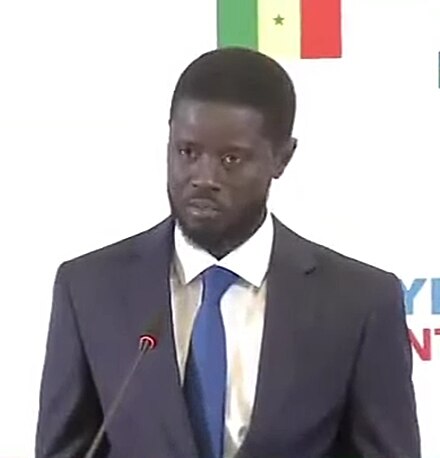March 25th, the day he was confirmed as president-elect, also happened to be Bassirou Diomaye Faye’s 44th birthday, making him the youngest democratically-elected head of state on the continent.
Giving his first acceptance speech, Faye said, “In electing me, the Senegalese people have decided on a break with a past. I promise to govern with humility and transparency.” He is set to become the fifth President of Senegal on April 2nd when he will be sworn in.
His road to power is inseparable from his close friend and political ally Ousmane Sonko who in July 2023, was barred from standing in the elections to succeed President Macky Sall, paving the way for Faye to become the number one challenger to coalition candidate Amadou Ba.
Faye was the former General-Secretary of the PASTEF party – Patriotes africains du Sénégal pour le travail, l’éthique et la fraternité, meaning the African Patriots of Senegal for Work, Ethics and Fraternity – which was founded by Sonko in 2014. The party was dissolved by the Ministry of Interior and Public Security in 2023 after being accused of “frequently calling on its supporters to insurrectional movements, which has led to serious consequences, including loss of life, many wounded, as well as acts of looting of public and private property.”
Faye spent more than 11 months in prison for “spreading false news, contempt of court, and defamation of a constituted body” following a social media post he made. Sonko was held in prison at the same time on various charges related to “fomenting insurrection”. However crucially, unlike Sonko, Faye was not barred from running in elections.
He is a much quieter, more introverted character than the charismatic firebrand Sonko. A devout Muslim, he has two wives, with four children by the first wife Marie Khone Faye, including one named Ousmane in honour of his friend.
According to the biography on his campaign website, he was often the top of his class growing up; he graduated from high school on Senegal’s southern coast in 2000, then studied law and obtained a master’s degree from Dakar’s Cheikh Anta Diop University.
In 2004, he passed the competitive entrance exam to Senegal’s National School of Administration (ENA) which trains the former French colony’s top civil servants. After graduation, he became a tax inspector in the Tax and Estates department, where he and Sonko met and became friends.
Despite their friendship, Sonko’s endorsement of Faye as candidate was hardly a ringing one: “My choice of Diomaye is not a choice from the heart, but from reason. I chose him because he meets the criteria that I have defined. He is competent and has attended the most prestigious school in Senegal,” Sonko said in a video message. “No one can say he is not honest. I would even say that he is more honest than me. I entrust the project into his hands,” he added.
Faye made the cut to run in the elections while still in prison, despite a late challenge from ruling coalition candidate Amadou Ba to have his candidacy rejected by the Constitutional Council.
A coalition of more than 100 parties, and some political heavyweights including former prime minister Aminata Toure, joined Faye’s campaign under the banner “Diomaye mooy Sonko, Sonko mooy Diomaye”, which in the local Wolof language means “Diomaye is Sonko, Sonko is Dioyame”.
Thanks to a general amnesty law passed shortly before the vote to ease political tensions, Sonko and Faye left their prison cells in Dakar on March 15th, accompanied by thousands of supporters who danced and chanted through the night. Both hit the campaign trail, crisscrossing the country and drawing thousands to their rallies and caravans.
Faye has declined to say what role Sonko might play in any future government, and has insisted he will be his own man. “Why do we want to focus on just one person in a government when I have a coalition that includes more than 120 people?” he said, brushing off concerns held by some voters that if he won, the country would end up with two men who believe they are president. “In a presidential election, only one person is elected in the end, and it’s he who is the president of the republic,” he said.

Bassirou Diomaye Faye 2024 Image – Wikimedia Commons
On the campaign trail, Faye, who has never held elected office, promised the Senegalese profound change and left-wing pan-Africanism. Pitching himself as part of a new generation of politicians, he believes in national sovereignty, a fairer distribution of wealth, and reform of what he sees as a corrupt justice system.
He has also promised to renegotiate oil and fishing contracts, and says he is not afraid of creating a new national currency in lieu of the CFA franc. He has vowed to fight the “French economic stranglehold” over Senegal. His rivals accuse him of leading a group of “adventurers” willing to pursue policies that are dangerous for the country.
Faye takes over the mantle of Africa’s youngest democratically-elected head of state from Ethiopian prime minister, Abiy Ahmed, currently aged 47. Two other leaders – Mahamat Deby of Chad and Assimi Goïta of Mali – who took power by force, are both aged 40. Cameroon has the dubious distinction of having the oldest serving head of state in the world – Paul Biya, aged 91.
Sources and Further Reading:
https://www.reuters.com/world/africa/prison-palace-fayes-road-senegals-presidency-2024-03-25
